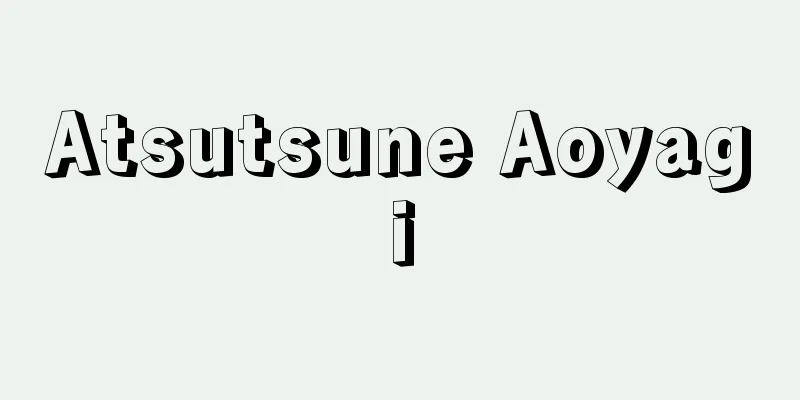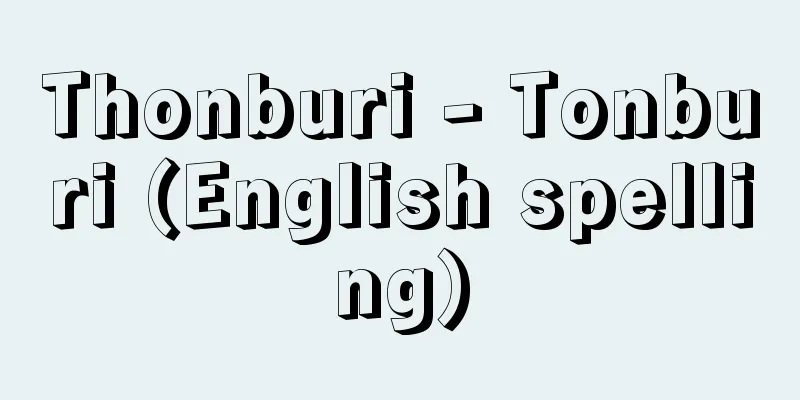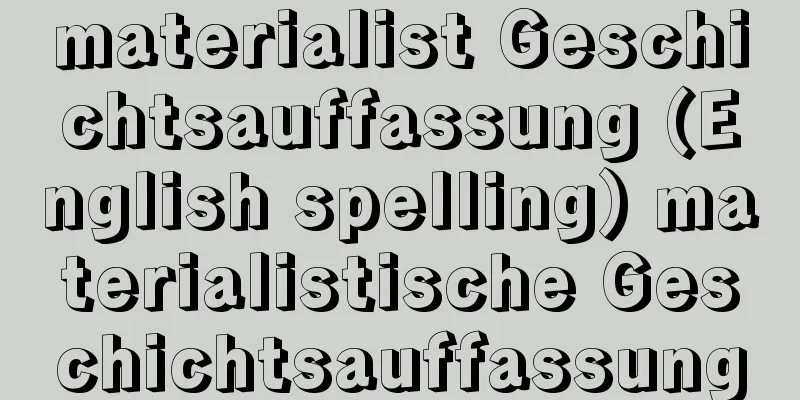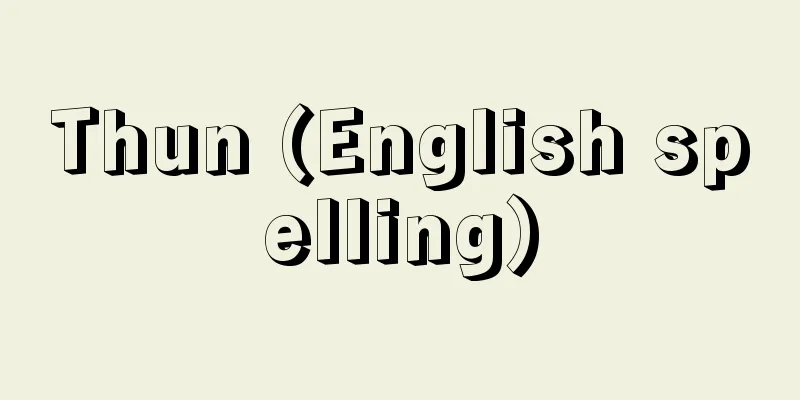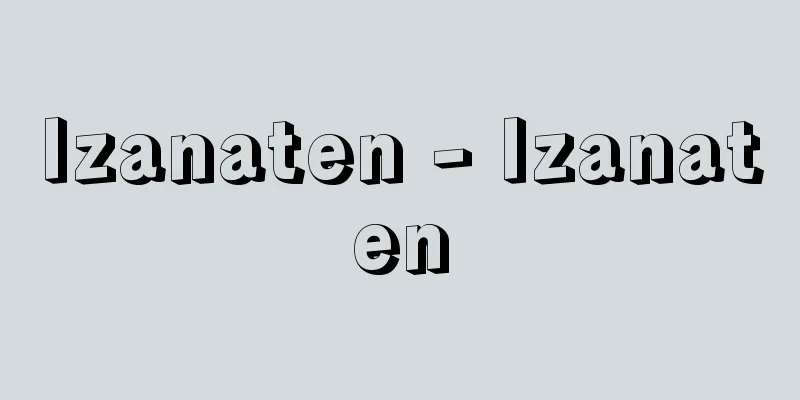Equatorial Guinea - Guinea Ecuatorial
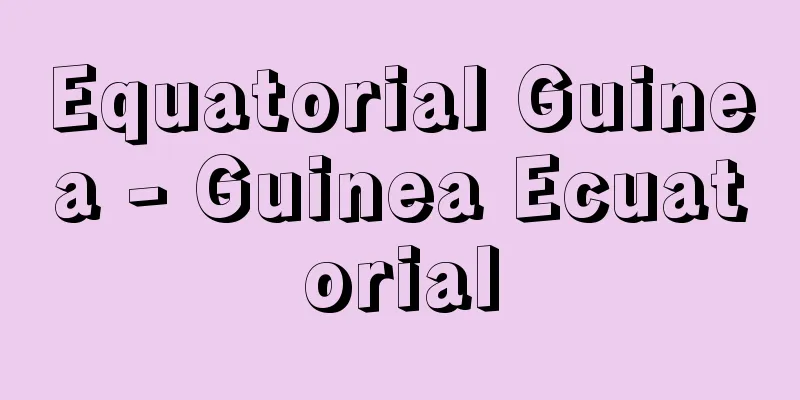
|
A country in the central-west of Africa consisting of several islands such as Bioko Island (formerly Ferdinand Po Island) floating in the Gulf of Guinea, and Mbini (formerly Rio Muni) on the mainland between Cameroon and Gabon. The official name is Repūblica Guinea de Ecuatorial. It has an area of 28,051 square kilometers and a population of 460,000 (estimated as of 2000). The capital is Malabo on Bioko Island. [Nobuyuki Hashimoto] NatureBioko Island is a volcanic island located about 50 km northeast of the African continent, with an area of 2,017 square kilometers. It is a volcanic island that is part of the Cameroon Mountains, and the highest peak, Malabo (formerly Santa Isabel) volcano (3,008 meters), rises in the north. Due to this topographical feature, the island's natural environment differs depending on the altitude. Up to 700 meters above sea level, there is a hot and humid zone with an average annual temperature of 25°C and an average annual rainfall of 1,300 to 2,000 mm. This zone, combined with the volcanic ash soil, is a coffee and cacao cultivation zone. In the zone between 700 and 1,500 meters above sea level, the average annual rainfall reaches 2,500 to 4,000 mm, and it is a tropical rainforest zone. Furthermore, in the zone between 1,500 and 2,200 meters above sea level, the rainforest recedes somewhat and connects to the tree line above it. The Mbini on the mainland is generally low and flat, with a climate of high temperatures and heavy rainfall all year round, and is covered in thick tropical rainforest from the coast to the inland. The rainy season lasts for more than eight months, with annual rainfall reaching 4,000 mm along the coast. [Nobuyuki Hashimoto] History and politicsFernando Po Island was discovered by the Portuguese in 1472, and Rio Muni was also discovered by the Portuguese in the late 15th century, and both became Portuguese territories. In 1778, Portugal ceded Fernando Po Island, Annobón Island (now Pagar Island), and Rio Muni to Spain in exchange for the sovereignty of present-day Brazil. Fernando Po Island was later occupied by the British for a time (1827-47), but after that it continued to be under Spanish control. It was only after 1904, when the three territories (Fernando Po Island, Annobón Island, and Rio Muni) were united to form Spanish West Africa, that Spain began to fully develop these areas. Development of Rio Muni, which has particularly poor weather conditions, finally began after World War II. In 1959, it became an overseas province of Spanish Equatorial Guinea, and in 1963, with the expansion of its autonomy, it became Equatorial Guinea. In October 1968, the country formally gained independence as a federal state consisting of the two states of Rio Muni and Ferdinand Po, with Macias Nguema as its first president. In 1972, he strengthened his dictatorial powers, making himself president for life, thoroughly suppressing opponents, and completely renaming the currency and places. The reign of terror under this president also led to the collapse of the economy, and in 1978 alone, 100,000 people fled the country, plunging the country into chaos. As a result, in August 1978, the president's nephew, Lt. Colonel Obiang Nguema Mbasogo, succeeded in a coup, Macias Nguema was executed, and Mbasogo became president. In August 1982, a new constitution was passed by referendum, and in August 1983, the first national assembly elections since independence were held. Mbasogo was elected in the first presidential election in June 1989, but the government remains unstable, with several attempted coups occurring during that time. Mbasogo was re-elected in the 1996 presidential election. [Nobuyuki Hashimoto] industryThe country's main industries are timber, cocoa and coffee plantations, and these products account for 90% of the country's exports. Before independence, cocoa production was ranked 8th or 9th in the world, but after independence, especially during the dictatorship of President Macias Nguema, many cocoa plantations were forced to close due to the withdrawal or exile of Spaniards and the return of many Nigerian workers, leading to a rapid decline in production and the collapse of the country's economy. In Mbini, timber and palm oil are the main products. Historically, Bioko Island was the political and economic center, so Mbini's backwardness, which has an advantage in terms of area (93% of the country) and population (81% of the total population), is a national issue. [Nobuyuki Hashimoto] Society and CultureThe inhabitants of Bioko Island are mainly Bubi people, and those of Mbini are mainly Fão people, but reflecting their history, there are also many people of mixed Portuguese and Spanish descent on Bioko Island, as well as descendants of slaves from various places and exiles from Cuba, and they have generally dominated the politics and economy of the island. The official language is Spanish, and 80% of the population is said to be Catholic, but traditional religions are also common in Mbini on the mainland. The Fang people of Mbini are a major group in Gabon, and have a strong ethnic identity as the mainland, whereas the Bubi people of Bioko Island have a weaker sense of their traditional culture. Transportation is also underdeveloped, with the capital Malabo and Mbini's Bata being connected by boat. Air routes are also irregular. [Nobuyuki Hashimoto] [Supplementary Material] |"> Equatorial Guinea flag ©Shogakukan Illustration/Shogakukan Creative "> Equatorial Guinea location map Source: Shogakukan Encyclopedia Nipponica About Encyclopedia Nipponica Information | Legend |
|
アフリカ中西部、ギニア湾上に浮かぶビオコ島(旧フェルナンド・ポー島)など数島と、カメルーンとガボンに挟まれた大陸部ムビニ(旧リオムニ)からなる国。正称は赤道ギニア共和国Repūblica Guinea de Ecuatorial。面積2万8051平方キロメートル、人口46万(2000推計)。首都はビオコ島のマラボ。 [端 信行] 自然ビオコ島は面積2017平方キロメートル、北東約50キロメートルにあるアフリカ大陸のカメルーン山に連なる火山島であり、北部には最高峰マラボ(旧サンタ・イサベル)火山(3008メートル)がそびえる。この地形的特色から、島の自然には高度による差異がみられ、標高700メートルまでは年平均気温25℃、年降水量1300から2000ミリメートルという高温湿潤地帯があり、この地帯は火山灰土壌と相まって、コーヒー、カカオの栽培地帯となっている。高度700から1500メートルの地帯では、年降水量が2500から4000ミリメートルに達し、熱帯多雨林地帯となっている。さらに1500から2200メートルの地帯では多雨林はやや後退し、その上部の森林限界へつながる。大陸部のムビニは一般に低平で、気候は年じゅう高温多雨、海岸より内陸まで厚い熱帯雨林に覆われている。雨期は8か月以上にわたり、海岸部での年降水量は4000ミリメートルに達する。 [端 信行] 歴史・政治フェルナンド・ポー島は1472年ポルトガル人フェルナンド・ポーによって発見され、またリオムニも15世紀後半にポルトガル人によって発見され、ともにポルトガル領となった。1778年、ポルトガルは今日のブラジルの領有権と引き替えに、フェルナンド・ポー島とアンノボン島(現パガル島)およびリオムニをスペインに割譲した。のち一時期フェルナンド・ポー島はイギリスに占領された(1827~47)が、その後はスペインの支配が続いた。スペインがこれらの地域の本格的な開発に乗り出したのは、1904年に3地域(フェルナンド・ポー島、アンノボン島、リオムニ)を統合してスペイン領西アフリカとして以後のことである。とくに気象条件の悪いリオムニの開発は、第二次世界大戦後にようやく始められた。59年にはスペイン領赤道ギニアとして海外州となり、63年には自治権拡大に伴って赤道ギニアとなった。 1968年10月、リオムニとフェルナンド・ポーとの2州からなる連邦国家として正式に独立し、初代大統領にはマシアス・ヌゲマが就任した。同大統領は72年自ら終身大統領になるなど独裁的権力を強め、反対派を徹底的に弾圧し、通貨や地名を全面的に改称した。こうした同大統領下での恐怖政治は経済をも破綻(はたん)させ、78年だけでも10万人が国外へ亡命するなど、大混乱に陥った。こうした事情から、78年8月、大統領の甥(おい)にあたるオビアン・ヌゲマ・ムバソゴ中佐がクーデターに成功し、マシアス・ヌゲマは処刑され、ムバソゴが大統領に就任した。82年8月、国民投票によって新憲法が成立し、83年8月、独立以来初の国民議会選挙を実施した。ムバソゴは89年6月初の大統領選挙で当選したが、この間何度もクーデター未遂事件が起こるなど、政権の不安定さは消えていない。1996年の大統領選挙でもムバソゴは再選された。 [端 信行] 産業この国の産業の中心は材木とカカオおよびコーヒーのプランテーション農業で、同国の輸出額の90%はこれらの品目で占められている。独立前のカカオの生産高は世界で8~9位を占めるほどであったが、独立後とくにマシアス・ヌゲマ大統領の独裁時代には、スペイン人の引き揚げや亡命、そして多数のナイジェリア人労働者の帰国などによって、多くのカカオ農園が閉鎖を余儀なくされ、その生産量は急激に低下し、同国の経済も破綻をきたすことになった。ムビニでは木材、やし油などが中心である。歴史的にビオコ島が政治、経済の中心であったため、面積的(全土の93%)にも人口的(全人口の81%)にも優位にあるムビニの遅れが国家的課題となっている。 [端 信行] 社会・文化住民は、ビオコ島ではブビ人、ムビニではファン人が中心であるが、歴史を反映してビオコ島ではポルトガル人やスペイン人との混血、各地からの奴隷やキューバからの流刑者の子孫なども多く、一般的には彼らが政治、経済を支配してきた。 公用語はスペイン語で、住民の80%はカトリック教徒とされているが、大陸のムビニでは伝統的宗教も一般的である。とくにムビニのファン人はガボンの主要グループでもあり、大陸本土の民族性を強くもつのに対して、ビオコ島のブビ人にはそうした伝統文化の独自性は弱まっている。交通の発達も十分ではなく、首都マラボとムビニのバータは船で結ばれている。航空路も不定期である。 [端 信行] [補完資料] |"> 赤道ギニアの国旗 ©Shogakukan 作図/小学館クリエイティブ"> 赤道ギニア位置図 出典 小学館 日本大百科全書(ニッポニカ)日本大百科全書(ニッポニカ)について 情報 | 凡例 |
<<: Equatorial coordinates - equatorial coordinates
Recommend
Usatsuhiko - Usatsuhiko
...The Engishiki Shinmeicho lists Hachiman Daibos...
kleftis (English spelling)
…His vision of the Greek Republic was not limited...
Margarine - margarine
A processed oil made by adding water and emulsifi...
Hansard
British printer. He joined Hughes & Co., print...
fluorescent X-rays
...The energy of X-ray particles is given by h ν,...
Lime plants - Lime plants
A plant common in limestone areas. It is sometimes...
Kano Shosenin Masanobu
…His other pen names were Jugansai and Suigetsu G...
Triumvirate (Latin)
Originally, it referred to the ancient Roman gove...
Vézelay - Vézelay (English spelling)
A small village in the Yonne department in centra...
Sahei
The government system of Baekje in ancient Korea. ...
Defect liability principle
...The concepts of "exercise of public autho...
Buddleia - Buddleia
A general term for the genus Buddleia in the Budd...
SOL - Sol
Occupation/Title singer nationality South Korea d...
Escape from Freedom
…Credenda is a situation in which legitimacy is m...
Indigo dyeing
A dyeing method in which threads and cloth are dye...
